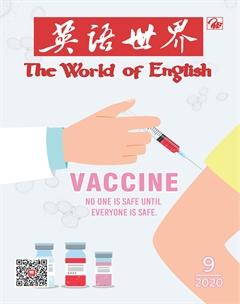不信任疫苗或致全球危机
米歇尔·罗伯茨
Public mistrust of vaccines means the world is taking a step backwards in the fight against deadly yet preventable infectious diseases, warn experts.專家警告说,公众对疫苗的不信任意味着,世界在同那些致命却可预防的传染病的抗争中倒退了一步。
The biggest global study into attitudes on immunisation suggests confidence is low in some regions.
The Wellcome Trust analysis includes responses from more than 140,000 people in over 140 countries.
The World Health Organization lists vaccine hesitancy as one of the top 10 threats to global health.
The global survey reveals the number of people who say they have little confidence or trust in vaccination.
When asked if vaccines were safe:
79% somewhat or strongly agreed
7% somewhat or strongly disagreed
14% neither agreed nor disagreed
When asked if they believed vaccines worked:
84% agree either strongly or somewhat
5% either strongly or somewhat disagree
12% neither agreed nor disagreed
Why does it matter?
There is overwhelming scientific evidence that vaccination is the best defence against deadly and debilitating infections, such as measles.
Vaccines protect billions of people around the world. They have completely got rid of one disease—smallpox—and are bringing the world close to eliminating others, such as polio.
But some other diseases, such as measles, are making a resurgence and experts say people avoiding vaccines, fuelled by fear and misinformation, is one of the main causes.
Dr Ann Lindstrand, an expert in immunisation at the WHO, said the current situation was extremely serious.
“Vaccine hesitancy has the potential, at least in some places, to really hinder the very real progress the world has made in controlling vaccine-preventable diseases,” she said. “Any resurgence we see in these diseases are an unacceptable step backwards.”
What about measles?
Countries that were close to eliminating measles have been seeing large outbreaks. Data shows a rise in cases in almost every region of the world, with 30% more cases in 2017 than 2016.
A decision not to vaccinate, for whatever reason, poses a risk to others as well as the individual from being infected themselves.
If enough people are vaccinated, it stops the disease from spreading through a population—something experts call “herd immunity”. Imran Khan, from the Wellcome Trust, said: “We are really concerned at the moment because for measles, anything less than 95% coverage can lead to outbreaks and that is what we are seeing.”
Where was trust low?
Some people living in several higher-income regions were among the least certain about vaccine safety.
In France—a country among several European ones now experiencing outbreaks of measles—one in three disagreed that vaccines were safe, according to the survey. That was the highest percentage for any country worldwide. People in France were also among the most likely to disagree that vaccines were effective, at 19%, and to disagree that vaccines were important for children to have, at 10%. The French government has now added eight more compulsory vaccinations to the three children in the country already receive.
Neighbouring Italy—where 76% agreed vaccines were safe—recently passed a law that allows schools to ban unvaccinated children, or fine their parents, after immunisation rates dwindled.
The UK has yet to go this far but Health Secretary Matt Hancock has said he “wont rule out” the idea of introducing compulsory vaccinations if necessary.
The US has also been experiencing its own measles outbreak—the biggest to hit the country in decades, with more than 980 confirmed cases in 26 states in 2019 to date.
In Northern America, and Southern and Northern Europe, just over 70% of people agreed that vaccines were safe. The figure was as low as 59% in Western Europe, and 50% in Eastern Europe.
Where was trust high?
Most people in lower-income areas agreed vaccines were safe. The highest number was in South Asia, where 95% of people agreed, followed by Eastern Africa, where the figure was 92%.
Bangladesh and Rwanda had nearly universal agreement about the safety and effectiveness and have achieved very high immunisation rates despite many challenges in physically getting vaccines to people.
Rwanda became the worlds first low-income country to provide young women universal access to the HPV vaccine that protects against cervical cancer.
What makes people sceptical?
In the survey, people with more trust in scientists, doctors and nurses tended to be more likely to agree that vaccines were safe. Conversely, those who had sought information about science, medicine or health recently appeared to be less likely to agree.
The Wellcome report does not explore all of the reasons behind low confidence but researchers say there are likely to be many factors involved.
Some of it may be complacency—if a disease has become less common, then the need to get immunised may feel less pressing when weighing the benefits against any possible risk.
The internet means beliefs and concerns about vaccines can be shared in an instant, spreading information that isnt necessarily based on fact.
In Japan, concerns about the HPV vaccine and a reported link with neurological problems were widely publicised, which experts think knocked confidence in immunisation in general.
Similarly, in France, there was controversy about a pandemic influenza vaccine—accusations that the government bought high quantities of the vaccine and unsubstantiated claims that it had been made too quickly and couldnt be safe.
In the UK, there has been misinformation circulating about the MMR jab and autism.
Dr Lindstrand said: “One of the most important interventions to counteract doubts and worries about vaccines is to have health workers really well trained and able and ready to recommend vaccinations based on scientific truth and to be able to respond correctly to questions and concerns that parents have and communities have.”
全球范围最大的有关免疫态度的调研表明,某些地区的人信心不足。
英国惠康信托基金会的调研分析了超过 140 个国家逾 14万人的答卷。
世界卫生组织将对接种疫苗犹豫不决列为了全球健康的十大威胁之一。
该项全球调研显示出对疫苗接种没有信心或根本不信任的人数。
当被问到是否认为疫苗安全时:
79% 某种程度上同意或强烈同意
7% 某种程度上不同意或强烈不同意
14% 既不同意也不反对
当被问到是否相信疫苗有效时:
84% 某种程度上同意或强烈同意
5% 某种程度上不同意或强烈不同意
12% 既不同意也不反对
疫苗为什么重要?
大量科学证据表明,接种疫苗是预防像麻疹这样致命和使人衰弱的传染病的最佳方法。
疫苗可以保护全球数十亿人的健康安全。疫苗已彻底铲除了天花,并将消灭小儿麻痹症等其他疾病。
但还有些疾病,例如麻疹,正死灰复燃——专家说,主要原因之一是人们由于恐惧和错误认知而不接种疫苗。
世卫组织免疫专家安·林德斯特兰德博士说,目前形势极其严峻。
她说:“至少在某些地方,公众对疫苗接种犹豫不决,而这可能真的阻碍世界在控制疫苗可预防疾病方面取得实实在在的进展。这些疾病出现任何死灰复燃的迹象都是令人无法接受的倒退。”
麻疹怎么了?
即将灭绝麻疹的国家又暴发了大规模麻疹疫情。数据显示,世界上几乎每一个地区的疫情病例数量都有所增加,2017年比2016年增加了30%。
无论出于何种原因决定不接种疫苗,都会增加本人及他人的感染风险。
如果足够多的人接种疫苗,将阻止该疾病在人群中传播——专家称此为“群体免疫”。惠康信托基金会的伊姆兰·汗说:“目前,我们真的很担心,因为对于麻疹来说,疫苗接种低于95%的覆盖率都可能导致疫情暴发,这就是我们正在见证的。”
哪里的信任度低?
居住在较高收入地区的一些人对疫苗的安全性最不信任。
调查显示,法国是麻疹疫情暴发的欧洲国家之一,三分之一的法国人认为疫苗不安全。这是全球所有国家中不信任占比最高的。法国人对疫苗有效性的怀疑也排在前列,占比19%,另外,10%的人认为疫苗接种对儿童并不重要。法国政府现在已将该国儿童强制接种疫苗的种类从3种增加到了11种。
法国的邻国意大利有76%的人认为疫苗是安全的。意大利疫苗接种率下降后,该国最近通过了一项法律,允许学校拒收未接种疫苗的孩子或对其父母罚款。
英国还没有那么严格,但卫生大臣马特·汉考克已经表示,他“不排除”必要时考虑采取强制接种的措施。
美国也一直在经历麻疹的暴发——这是几十年来该国最大的麻疹疫情,截至2019年6月已有26个州确诊超过980例病例。
在北美、南欧和北欧,认为疫苗安全的人占比仅略高于70%。在西欧,这一数字低至59%,东欧仅为50%。
哪里的信任度高?
较低收入地区的大多数人都认为疫苗安全。信任度最高的是南亚,有95%的人表示赞同;其次是东非,92%。
在孟加拉国和卢旺达,人们普遍认同疫苗的安全和有效,尽管在获得疫苗上还面临许多挑战,但接种率非常高。
卢旺达成为世界上第一个为年轻女性普遍接种预防宫颈癌的人乳头瘤病毒疫苗(HPV疫苗)的低收入国家。
是什么让人们心怀疑虑?
在调研中,对科学家和医护人员更信任的人往往认同疫苗是安全的。相反,那些曾搜寻科学、医学或健康信息的人最近似乎不太认同。
惠康的报告并未探讨低信认度背后的所有原因,但是研究人員表示,这可能涉及多方面因素。
有些人可能抱有侥幸心理——如果某种疾病变得不那么普遍了,权衡利弊,接种疫苗可能就没那么紧迫了。
互联网意味着人们可以瞬间共享关于疫苗的各种看法和疑虑,传播不一定基于事实的信息。
在日本,对HPV疫苗及其所谓与神经系统疾病有关的担忧广为流传,专家认为这普遍打击了人们对疫苗接种的信心。
与之相似,在法国,对某种大流行性流感疫苗也存在争议——有人指责政府购买了大量疫苗,还有人毫无根据地指称疫苗生产得太快而不可能安全。
在英国,有关MMR(麻疹、 流行性腮腺炎、 风疹)疫苗接种和孤独症的不实信息四处流传。
林德斯特兰德博士说:“要消除对疫苗的怀疑和忧虑,最重要的措施之一就是让卫生工作者真正接受良好的培训,有能力并准备好基于科学事实提供疫苗接种建议,并能够准确回应父母和社区居民的问题和疑虑。”
(译者为“《英语世界》杯”翻译大赛获奖者)

